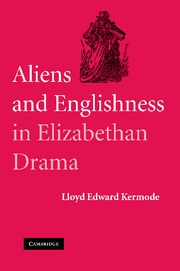Book contents
- Frontmatter
- Contents
- Preface
- Acknowledgements
- 1 Introduction – aliens and the English in London
- 2 Discovering the alien in Elizabethan moral drama
- 3 Accommodating the alien in mid-Elizabethan London plays
- 4 Incorporating the alien in Shakespeare's second tetralogy
- 5 Being the alien in late-Elizabethan London plays
- Postscript: Early modern and post-modern alien excursions
- Notes
- Bibliography
- Index
4 - Incorporating the alien in Shakespeare's second tetralogy
Published online by Cambridge University Press: 28 June 2009
- Frontmatter
- Contents
- Preface
- Acknowledgements
- 1 Introduction – aliens and the English in London
- 2 Discovering the alien in Elizabethan moral drama
- 3 Accommodating the alien in mid-Elizabethan London plays
- 4 Incorporating the alien in Shakespeare's second tetralogy
- 5 Being the alien in late-Elizabethan London plays
- Postscript: Early modern and post-modern alien excursions
- Notes
- Bibliography
- Index
Summary
This chapter returns to the much-discussed second tetralogy of Shakespeare's history plays to read them in the context of the process of alien confusion that concerns this book. I begin with Richard II to show the importance of the notion of an excursion into alien territory, a journey of some sort by characters – in this case Bolingbroke and Mowbray – invested in proving (invariably competitively) their Englishness. The journey entails questioning and crossing specific borders and pulling back identity from across those zones of difference. This trope of the excursion expands on earlier versions of it that we saw in the moralities. I then argue for the importance of Welshness to a study of Englishness before going on in a longer section to examine Welshness as a continually contested presence in the tetralogy. Welshness is a prime example of the alien that is inevitably confused, revealed, and requires excursion, negotiation across borders, and even alteration of the previously conceived self to achieve a conception and display of a powerful concept of ‘Englishness’. Welshness cannot be reduced to ‘Great’ British royal lineage, nor can it be eliminated as provincial or foreign uncouthness (in both the early modern and modern senses of the term). It must be represented in all its contiguity and closeness to England and Englishness (thus the importance of geography and topography), while it maintains its alien status as the other that Englishness incorporates, without destroying, to enlarge itself.
- Type
- Chapter
- Information
- Aliens and Englishness in Elizabethan Drama , pp. 85 - 118Publisher: Cambridge University PressPrint publication year: 2009



